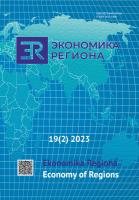Детерминанты кадрового обеспечения региона с учетом отраслевой специализации
Determinants of Human Resources Considering Industry Specialisation
Author(s): Zhanna Anatolevna Ermakova, Natalia V. Speshilova, Vyacheslav N. ShepelSubject(s): Economy, Geography, Regional studies, Human Resources in Economy, ICT Information and Communications Technologies
Published by: Институт экономики Уральского отделения Российской академии наук
Keywords: human resources; regional economy; digital economy competencies; automated decision support system; labour movement;
Summary/Abstract: Since digitalisation of the economy greatly affects the labour market, human resources in each constituent entity of Russia should be developed taking into account regional specialisation (agriculture, industry or other). Thus, the study aims to substantiate the determinants of human resources in regional economy by considering the dominance of various economic activities. Statistical data analysis, as well as comparison and causal analysis methods were utilised. The following significant determinants of human resources in regional economy were identified: the management system, labour availability and movement, vocational education system and, in particular, the role of local universities in it. The study suggested to introduce an automated intelligent decision support system (AIDSS) into the activities of regional authorities and proposed a methodological approach to the block-by-block organisation of data storage (on the example of Orenburg oblast). It is noted that the architecture and algorithm of AIDSS are being developed, which can be used for managing personnel, as well as for studying and predicting various factors affecting regional economy. The testing demonstrated that the population in Orenburg oblast has been decreasing since 2014. The share of rural population decreased more than the urban one; this factor negatively affected the reproduction of labour resources, considering economic specialisation of this regions. Orenburg oblast is characterised by slow implementation of innovations and the need to develop knowledge-intensive industries; therefore, it is necessary to intensify the training of highly qualified personnel (primarily at regional universities) competent to work in the conditions of digitalisation of the economy. Scientists and specialists in the field of human capital development can use the research findings to create state policies to ensure human resources in Russian regions.
Journal: Экономика региона
- Issue Year: 19/2023
- Issue No: 2
- Page Range: 355-369
- Page Count: 15
- Language: Russian

